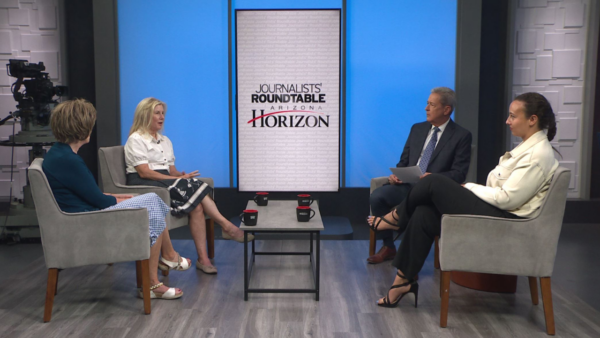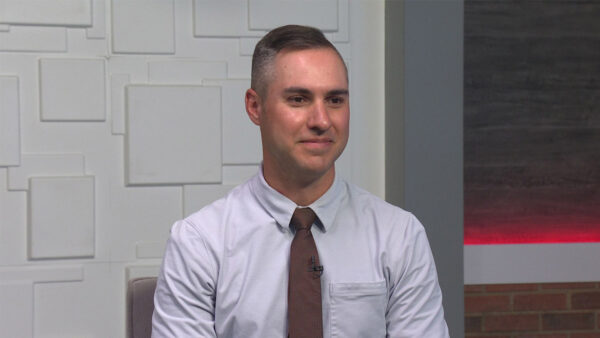A new study by Arizona State University’s W.P. Carey School of Business shows that campaign contributions do help businesses. The report shows that companies making campaign contributions specifically to tax-writing members of Congress wind up paying lower tax rates over time. Assistant Professor Jennifer Brown of the W. P. Carey School of Business, one of the study authors, will talk about the report.
Ted Simons: Good evening and welcome to Arizona Horizon. I'm Ted Simons. A new study by asu's W.P. Carey School of Business shows that companies making campaign contributions specifically to tax writing members of Congress wind up paying lower tax rates over time. Assistant professor Jennifer Brown of the W.P. Carey School of Business is one of the studies' authors and is here to talk about the report. Welcome to Arizona Horizon.
Jennifer Brown: Thank you for having me.
Ted Simons: Give me a better definition of what exactly the study looked at.
Jennifer Brown: Well, we are interested in seeing what, if any, benefit firms get from their corporate political activity. They could have a variety of tactics, a variety of things they can do developing a corporate political strategy so they can lobby. They can make campaign contributions, so we just want to get a better idea of what future benefit do these firms, tangible things do the firms get from investing in the political marketplace.
Ted Simons: And as far as corporate campaign activity is concerned, other than lobbying or directing, what else is involved?
Jennifer Brown: So corporate campaign activity is distinctly different from lobbying, so lobbying, they are going in and looking -- they are advocating for a specific issue, and there are really no limitations on lobbying activity. Corporate campaign contributions, that is contributions, support directly to the candidate to get the candidate re-elected. So, lobbying, they are going in and trying to get at an issue. They are advocating for a specific issue. These campaign contributions are what they are giving to the candidate to get them re-elected. There are limits on the amount of money that they can give. So, the corporate sponsored pack can give $5,000 per election cycle to a per -- per candidate, particular candidate, they can give them 5,000. In the primary. 5,000 in the general election. That's going, particularly, to the candidate themselves.
Ted Simons: With that in mind, we're talking directly to candidates, not parties, not groups or did you look at that?
Jennifer Brown: We did not look at that. But, the corporate sponsored pack can also give to, to other kinds of things, but we looked at what they gave to the candidates.
Ted Simons: As far as -- now we have got the idea of what campaign activity is. What about the benefits? How is that defined?
Jennifer Brown: The way that we look at it, a very specific setting. We look at do they get lower tax rates? Other studies had looked at do they just have higher returns in the market? Do they have higher return on assets? So, sort of more general measures of outcome. The problem with looking at that, and looking at any kind of outcome, is tricky, you know, do they go the vote they want, when the votes come up? It's not really clear what they want. Sometimes they want a particular piece of legislation to be passed. Sometimes, they want a regulation not to come into place. They want -- please put that regulation on the back burner. We don't want that regulation or we don't want that particular tax to be passed. So, it's, you know, figuring out what is the benefit that they derive in measuring that. That's, actually, a challenge when it comes to doing this research. So, what we did was looked at future long-term tax rates, so after they made the contributions, we looked at a period here, and they make the contributions in the future, what were the tax rates, how much did they pay in tax in terms of the total book and cash income. They pay lower. The ones who make -- the ones who support more candidates, they pay lower rates.
Ted Simons: So there is a direct correlation there. You found that correlation.
Jennifer Brown: We did.
Ted Simons: Were you surprised?
Jennifer Brown: A little bit because there was some mixed evidence. It seems pretty intuitive. Why wouldn't they -- why would they be doing that if they did not expect to get something, but we were a little surprised because there is a bit of research that says, you know, these campaign contributions are pretty small amounts of money. They are small in terms of the total amount of money that the candidate needs to get re-elected. These candidates need a lot of money to get re-elected to Congress, to get re-elected to the Senate. The amount of mope coming from, you know, 5,000 is just kind of a drop in the bucket. So, are they really getting something for that? And then, they are, actually, small in comparison to the lobbying dollars. So, we were surprised that we would find something, and also, there is some research out there suggesting that the corporation may not be getting the benefit, that the corporate sponsored pact dollars are really a perk of the manager, so the particular manager of the corporation, the corporate executive, he's directing the corporation to make campaign contributions, he or she, directing the corporation to make campaign contributions on behalf of the pet project, or the pet candidates that he or she is interested in, and that would not translate to a benefit for the firm.
Ted Simons: Are we talking about buying votes? Are we talking about buying access? A bit of both? What are we seeing?
Jennifer Brown: What we say is that it's not about this direct buying of a vote, it's not like -- you contribute today, and then you turn around and you expect that legislator who gets elected to vote for what you want tomorrow. It is really a sort of long-term game. It's a long-term investment. What they are doing is they are investing in relationships with these policy-makers, and then what happens is the ones who have stronger relations with policy-makers, relationships in place, when something arises that is important to them, a measure comes up on the hill that's important to them. Then, they have a seat at the table. They have -- it's almost like a, you know, an ear. You are buying someone's ear, so you have more of a chance that when your issue comes up, they will listen to you. Then your lobbying dollar will go further.
Ted Simons: You mentioned this was intuitive. Last question. Why study this particular question because it is intuitive, and as you said, you have got to wonder about people donating the campaigns where they don't expect anything in return.
Jennifer Brown: I think it's just a desire to have systemic evidence and really to resolve these prior, sort of mixed findings in the research about whether it's just a lobbying that matters, or whether the campaign contributions, direct contributions to the candidates, actually, have influence, and where does the influence bear out, and we show it bears out in the lower tax rates.
Ted Simons: So, real quickly, what do we take from the study?
Jennifer Brown: What we can take away is that they make investments, and that it's a long-term game, and that they do it for the benefit of the firm, and that they say a benefit.
Ted Simons: Interesting stuff. Good to have you here and thanks for joining us.
Jennifer Brown: Thanks so much.
Jennifer Brown:Assistant Professor, W. P. Carey School of Business at Arizona State University;























